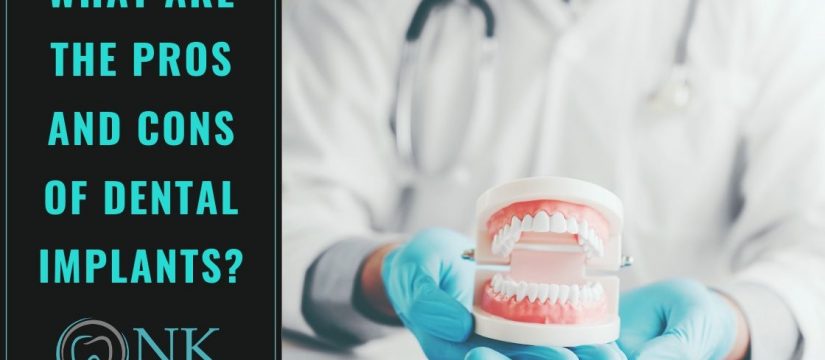
Dental implants are a routine restorative dental procedure. Anyone can potentially need an implant for any number of reasons—including major tooth injury, tooth decay or sudden tooth loss. Today’s dental implants are designed to blend in with your natural teeth and can provide an alternative to dentures or bridgework that do not fit well, as well as offer an option when a lack of natural teeth roots don’t allow building denture or bridgework tooth replacements. While your dentist will ultimately decide if you are a good candidate, it’s important to be knowledgeable about dental implants both before and after the procedure.
How Can a Dental Implant Improve My Health?
Your dentist will not recommend a dental implant unless necessary. With that said, there are many benefits that make the procedure well worth it. Dental implant surgery performed by an experienced dentist can achieve excellent results that will restore function and a natural, aesthetically pleasing appearance. Our blog post—”Oral Health is Overall Health”—covers the relationship between maintaining optimum oral health and preventing cardiovascular disease and other conditions.
The Risks of Not Replacing Teeth
One of the main reasons you may need a dental implant is advanced gum disease (also known as periodontal disease), which is often coupled with tooth decay. Signs of gum disease may include a variety of discomforts, such as swollen or bleeding gums, pain when chewing/talking/brushing, receding gum lines, and increased sensitivity to warm and/or cold temperatures. Some of these symptoms can potentially lead to infections, increased discomfort, and jawbone deterioration if left untreated.
While crowns and bridges can help ease some tooth damage from accidents or decay, sometimes the more intact solution of a dental implant is needed. However, dental implants are only a viable option if the jawbone underneath is strong enough to support an implant. Bone grafts can help strengthen the “anchor” bone required for a dental implant, if possible. Conditions such as osteoporosis can lead to a decrease in bone density, making implants a much less likely option due to the increased risk of bone fractures.
Your dental implant options depend on your individual case and your dentist’s recommendation. Dental implants can be a great way to prevent further tooth loss or discomfort, but there is no need to feel disappointed if you are not a candidate, as there are a number of other dental options available for treating/replacing lost, broken or decaying teeth.
Smoking is Harmful for Implants
Smoking harms your health in many ways, including your dental implants. While smokers are not excluded from dental implant eligibility, the act of smoking soon before and after your procedure can cause serious complications. Smoking can impede the healing process due to restricted blood flow to your gums, drastically increasing the possibility of failure.
If you want to optimize the success of your dental implant and general oral health, it is advised not to smoke the week before the procedure and refrain from smoking for two months afterwards. Of course, completely giving up smoking will also greatly improve your overall health.
Questions to Ask Your Dentist Before Surgery
Dental implants, while relatively commonplace, are still a surgical treatment. Therefore, it’s important to be fully informed about what to expect. Three important questions to ask your dentist before proceeding are as follows:
How long are the implants expected to last?
While over 90% of dental implants have been shown to last 13 or more years, it’s still a good plan to ask your dentist about the expected length of time your implants will last. Your individual condition may affect the length of useful life.
What is the cost of the procedure?
The cost of a dental implant varies widely. Additionally, dental insurance plans do not commonly cover the cost of dental implants, although some medical insurance plans may offer partial coverage. Be sure to ask your dentist for a full written treatment plan that includes all procedure costs, required appointments and any follow-ups. You should also inquire about why your dentist recommends the specific type of implant for your procedure.
What experience does your specific dentist have with dental implant procedures?
There is no such thing as asking too many questions when it comes to your health, and this includes ensuring your health provider is qualified to perform the procedure you will need. This also applies to your dentist. Ask about training, board certifications (including oral and maxillofacial surgery, prosthodontics, or periodontics), and how many dental implant patients they have treated.
Your Top Choice for Dental Implants in Chicago
Look no further than NK Family Dental for safe and reliable dental implant services in Chicago. Dr. Nilofer Khan and Dr. Elmisalati both provide the highest-quality dental, orthodontic and periodontic care, backed by many years of education, certifications, and ongoing training. Learn more about our other dental services, including oral surgery and periodontics treatment. Then, contact us to schedule your next consultation appointment!
